The Harpies are mythical creatures that appear in various ancient Greek and Roman sources. Their name derives from the Greek word harpazein, which means “to snatch” or “to seize”.1 This reflects their role as snatchers of people and things, especially those who have offended the gods. They are often associated with the winds, particularly the stormy ones, 2 and they may have some connections with the ancient Near Eastern storm deities, such as the Sumerian Anzu and the Hittite Illuyanka.
Origins of the Harpies
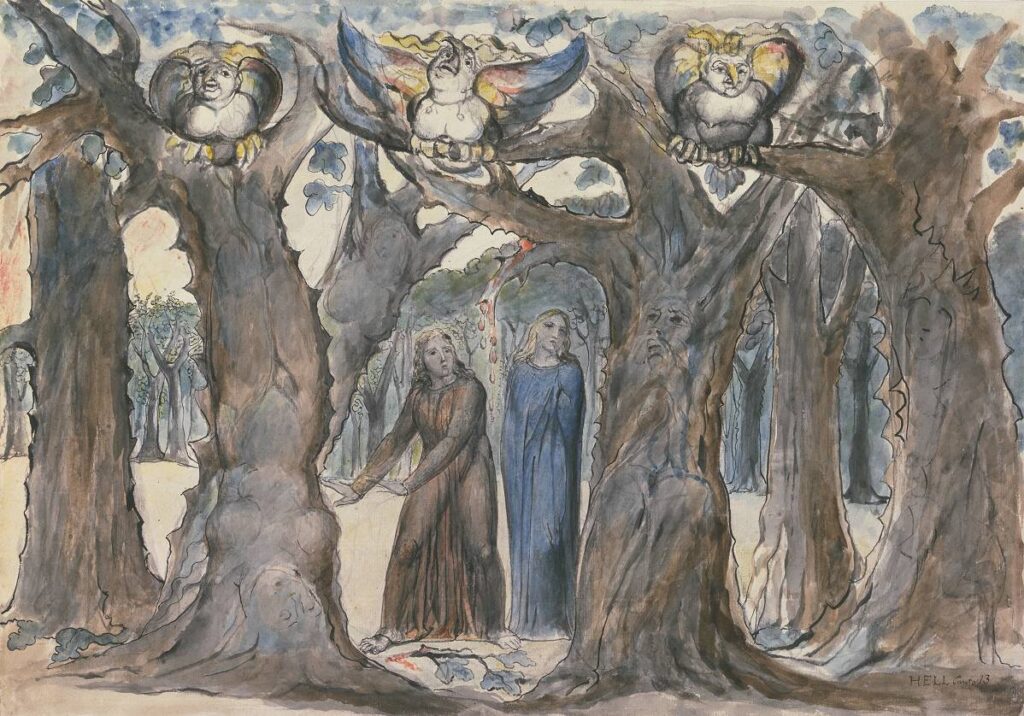
The Harpies have different descriptions in different sources. In the earliest accounts, such as Hesiod’s Theogony, they are described as beautiful women with wings, who can fly faster than the wind. Their names are Aello (“Stormswift”) and Ocypete (“Swiftwing”).
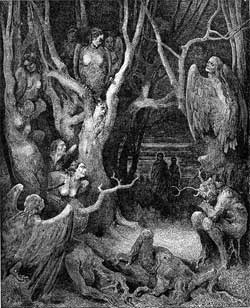
[T]he Harpyiai (Harpies) of the lovely hair, Okypete (Ocypete) and Aello, and these two in the speed of their wings keep pace with the blowing winds, or birds in flight, as they soar and swoop, high aloft.
– Theogony 265–267
In later accounts, such as Virgil’s Aeneid, they are depicted as ugly and monstrous, with bird-like features such as claws, beaks, and feathers.
Bird-bodied, girl-faced things they (Harpies) are; abominable their droppings, their hands are talons, their faces haggard with hunger insatiable
– Aeneid 3.216
Some sources mention two more sisters, Celaeno (“the dark”)3 and Podarge (“fleet-foot”)4.
The Harpies are usually considered to be the daughters of Thaumas (“wonder”) and Electra (“miracle” or “shining”), two primordial sea gods who belonged to the race of the Titans. They have two sisters, Iris and Arke, who are also associated with the rainbow and the messenger of the gods.
They are sometimes called “the hounds of Zeus” because they obey his commands and punish his enemies. They are also related to other female figures, such as the sirens, the furies, and the fates.
How the Argonauts Freed Phineus from the Harpies
One of the most famous myths involving the harpies is that of King Phineus and the Argonauts. It is one of the adventures of the Argonauts, a group of heroes who sailed with Jason in search of the Golden Fleece, a magical sheepskin that could grant any wish.
King Phineus was a son of Poseidon, the god of the sea, and a descendant of Zeus, the king of the gods. He had the gift of prophecy, which allowed him to see the future and reveal it to others. However, he abused his gift and revealed too much of the divine secrets to mortals. This angered Zeus, who cruelly punished him. He blinded him and sent the harpies, winged creatures that snatched or spoiled his food, leaving him to starve. He was doomed to live in misery and hunger.
The Argonauts arrived at his island during their voyage and found him in a pitiful state. They felt sorry for him and offered to help him get rid of the harpies in exchange for his guidance. Phineus agreed and told them to set a table with food for him. As soon as he began to eat, the harpies appeared and attacked. But this time, they met their match: two of the Argonauts, Calais and Zetes, were the sons of Boreas, the north wind god. They had wings on their feet and could fly as fast as the harpies. They chased them away with their swords and pursued them across the sea.
There, they were stopped by Iris, the goddess of the rainbow and messenger of Zeus. She told them that Zeus had ordered them not to harm the harpies any further, but promised that they would never bother Phineus again.
And assuredly they would have torn them to pieces, despite heaven’s will, when they had overtaken them far off at the Floating Islands, had not swift Iris seen them and leapt down from the sky from heaven above, and cheeked them with these words: “It is not lawful, O sons of Boreas, to strike with your swords the Harpies, the hounds of mighty Zeus; but I myself will give you a pledge, that hereafter they shall not draw near to Phineus.
– Argonautica Book 2
The harpies fled to a remote island called Strophades (meaning “the islands of turning”), where they remained until their death.
Prince Aeneas and the Harpies
Another myth that mentions the harpies is that of Aeneas and his companions after the Trojan War, which is told by Virgil in his epic poem, the Aeneid. Aeneas was a Trojan prince who escaped from the fall of Troy by the Greeks. He led a group of survivors across the sea to find a new homeland.
On his journey, he and his group landed on an island where a herd of cattle and sheep were grazing. They killed and cooked the animals for a feast. But they did not know that the animals belonged to the harpies, who lived on the island. The harpies came and attacked them, spoiling their food with their droppings. Aeneas and his men tried to fight back, but they could not harm the harpies, who were protected by their feathers.
One of the harpies, Celaeno, spoke to Aeneas and gave him a prophecy. She said that he would reach Italy, his destined land, but not before he suffered from hunger and had to eat his own tables. She also warned him not to harm the harpies anymore, or they would make his life more miserable.
Only one, Celaeno, ill-boding seer, alights on a lofty rock, and breaks forth with this cry: ‘Is it even war, in return for slaughtered cattle and slain bullocks, is it war you are ready to bring upon us, sons of Laomedon, and would you drive the guiltless Harpies from their father’s realm? Take then to heart and fix there these words of mine. What the Father omnipotent foretold to Phoebus and Phoebus Apollo to me, I, eldest of the Furies, reveal to you. That you may reach Italy you sail the seas and invoke the winds: to Italy you shall go and freely enter her harbours; but you shall not gird with walls your promised city until dread hunger and the wrong of violence towards us force you to gnaw with your teeth and devour your very tables!’
– Aeneid Book 3 (245-257)
Aeneas and his group were frightened by Celaeno’s words and fled.
The harpies are contradictory figures in Greek and Roman mythology, who embody both beauty and ugliness, wisdom and folly, justice and cruelty. Depending on the source, they are either the graceful daughters of the sea or the hideous hags of the air. They snatch away food and people but also reveal secrets and prophecies. They are agents of Zeus’s anger, but also of his mercy. Thus, they represent the power of the wind, the wrath of the gods, and the fate of mortals.
References:
- Apollonius Rhodius. Argonautica. Translated by R.C. Seaton, Harvard University Press, 1912.
- Atsma, Aaron J. “Harpies (Harpyiai)” Theoi Greek Mythology.
- Cierra Tolentino, “Harpies: Storm Spirits and Winged Women“, History Cooperative, October 4, 2022.
- Hesiod. Theogony. Translated by Hugh G. Evelyn-White, Loeb Classical Library, 1914.
- Homer. Odyssey. Translated by A.T. Murray, Harvard University Press, 1919.
- Morford, Mark P.O., et al . Classical Mythology. Oxford University Press, 2023.
- “Online Etymology Dictionary.” 3 Sept. 2023.
- Virgil. Aeneid. Translated by H.R. Fairclough, Loeb Classical Library, 1916.
- Westwood, Jennifer. “Harpies.” Encyclopedia Mythica, 1997.
Footnotes:
- “Online Etymology Dictionary.” 3 Sept. 2023. ↩︎
- Homer calls them “spirits of the storm” in Odyssey 1.241, 14.371. ↩︎
- Virgil, Aeneid 3.209 ↩︎
- Homer, Iliad 16.148 ↩︎

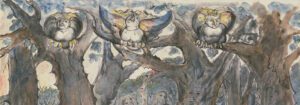
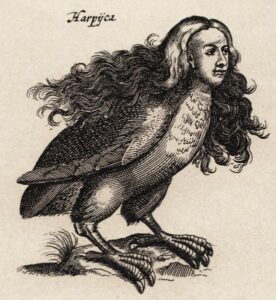
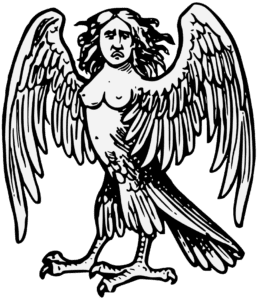
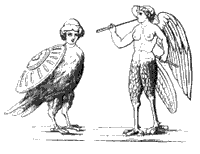









 Actun Tunichil Muknal: A Journey into the Mayan Underworld in Belize
Actun Tunichil Muknal: A Journey into the Mayan Underworld in Belize